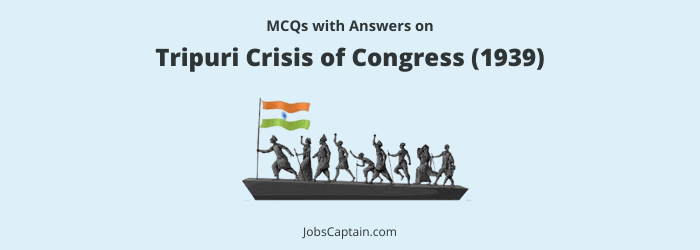
Question 1. Who of the following presided over the Haripura Session of the Indian National Congress?
(A) J.L. Nehru
(B) S.C. Bose
(C) J.B. Kriplani
(D) C.R. Das
Question 2. ‘Haripura’ where annual session of Indian National Congress was held under the Presidentship of Subhash Chandra Bose in 1938 is situated in the State of ________.
(A) Rajasthan
(B) Maharashtra
(C) Madhya Pradesh
(D) Gujarat
Question 3. The object of the Butler Committee of 1927 was to ________.
(A) Improve the relationship between the Government of India and the Indian States
(B) Impose censorship on national press
(C) Define the powers of the Secretary of State for India
(D) Define the jurisdiction of the Central and Provincial Governments
Question 4. Who was elected the President of Indian National Congress in 1938?
(A) J.B. Kriplani
(B) Pattabhi Sitaramaiya
(C) Subhash Chandra Bose
(D) Abul Kalam Azad
Question 5. Subhash Chandra Bose was chosen President of Congress in Tripuri Session of Indian National Congress in the year 1939. Where is Tripuri?
(A) Ahmedabad
(B) Jabalpur
(C) Pune
(D) Calcutta
Question 6. In which of the following session of Indian National Congress, Subhash Chandra Bose was elected as President for the second time?
(A) Calcutta Session
(B) Tripuri Session
(C) Madras Session
(D) Haripura Session
Question 7. Netaji Subhash Chandra Bose became the President of Indian National Congress by defeating which leader?
(A) P. Sitaramaiya
(B) Maulana Abul Kalam Azad
(C) J.L. Nehru
(D) Sardar Vallabhbhai Patel
Question 8. Subhash Chandra Bose defeated Pattabhi Sitaramaiya and became President of Indian National Congress at _________.
(A) Madras Session, 1927
(B) Lahore Session, 1929
(C) Tripuri Session, 1939
(D) Haripura Session, 1938
Question 9. Who became the President of the Indian National Congress after the resignation of Subhash Chandra Bose?
(A) Sardar Patel
(B) Rajendra Prasad
(C) Pattabhi Sitaramaiya
(D) Maulana Abul Kalam Azad
Question 10. The whole dispute between Subhash Chandra Bose and right wing, after the Tripuri Session of Congress, centred round to the question of_________.
(A) Double membership of Congress Socialist Party members
(B) Attitude towards Central Government
(C) Policy towards princely States
(D) Formation of Congress Working Committee
Question 11. Which Indian nationalist leader looked upon a war between Germany and Britain as a godsent opportunity which would enable Indians to exploit the situation to their advantage?
(A) Jawaharlal Nehru
(B) Subhash Chandra Bose
(C) M.A. Jinnah
(D) C. Rajagopalachari
